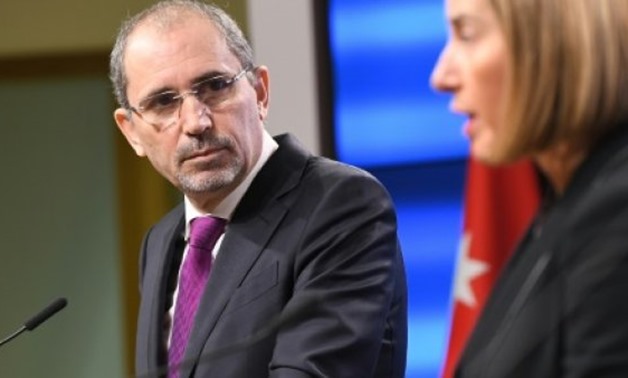
© AFP | Jordan's Foreign Minister Aymane Safadi, left, and EU foreign policy chief Federica Mogherini addressing the press in Brussels on Friday
BRUSSELS - 8 December 2017: The EU's foreign policy chief Federica Mogherini and her Jordanian counterpart Aymane Safadi said Friday that they would not abandon the two-state solution to resolve the Israeli-Palestinian conflict.
"We definitely don't give up," Mogherini said, after US President Donald Trump's declaration of Jerusalem as Israel's capital sent shock waves through the region and sparked protests.
She said the Oslo Accords of 1993 and 1995 -- which started a process aimed at achieving a peace treaty and fulfilling "the right of the Palestinian people to self-determination" -- remained the objective.
The "only realistic solution is based on two states with Jerusalem as the capital of both states," she said.
Safadi echoed her, saying: We cannot give up. There is no alternative to the two-state solution."
The peace process has been languishing since 2014.
Trump's defiant announcement has been met with an almost universal diplomatic backlash, and prompted a call for a new intifada, or uprising, from the leader of Hamas, the Palestinian Islamist group which runs the Gaza Strip.
The status of Jerusalem is deeply sensitive for Muslims, and protesters have been taking to the streets in cities across the world following the policy shift.
Mogherini said she had suggested that the "quartet" working on the peace process -- the EU, the US, Russia and the United Nations -- be "enlarged" to include Jordan, Saudi Arabia and Norway.
She said the idea of a Palestinian state with its capital and its own institutions was essential for security in the region, including that of Israeli citizens.
Trump said his defiant move -- making good on a 2016 presidential campaign pledge -- marks the start of a "new approach" to solving the Israeli-Palestinian conflict.
But many analysts question how a fair peace process could be possible by granting such a major Israeli demand while seeming to require nothing in return.
Israel has long claimed all of Jerusalem as its undivided capital, while the Palestinians see the eastern sector of the city as the capital of their future state.

Comments
Leave a Comment